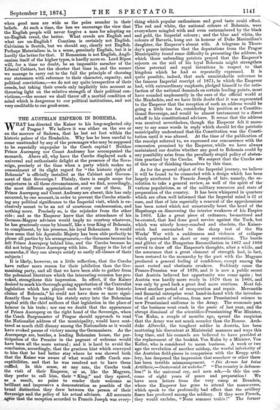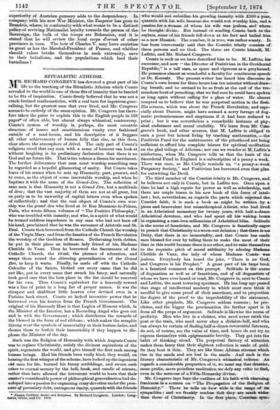THE AUSTRIAN EMPEROR IN BOHEMIA.
NV-11T has directed the Kaiser to his long-neglected city Aof Prague ? We believe it was either on the eve or on the morrow of Sadowa, that he last set foot within the historic palace of the Hradschin. Why has he been careful to come unattended by any of the personages who may be supposed to be espeeially unpopular in the Czech capital? Neither Prince Auersperg nor Count Andrassy has accompanied the monarch. Above all, why have the Czechs displayed such a universal and enthusiastic delight at the presence of the Sove- reign, precisely at the time when a party which makes no concealment of its slight regard for "the historic rights of Bohemia" is officially installed as the Cabinet and Govern- ment of that Sovereign ? Plainly, there is ample scope for conjectures in all these circumstances, and we find, accordingly, the most different appreciations of every one of them. If Prince Auersperg and Count Andrassy are absent, this has only occurred, by one account, in order to prevent the Czechs attach- ing any political significance to the Imperial visit, which is ex- clusively meant to be an act of courteous condescension, and nothing more. Precisely so, is the rejoinder from the other side ; and as the Emperor knew that the attendance of his German-Magyar advisers would imply no courtesy whatever, he has graciously come by himself, like a true King of Bohemia, to compliment, by his presence, his loyal Bohemians. It would thus seem that his Apostolic Majesty has been able perfectly to please all parties by his arrangements,—the Germans because he left Prince Auersperg behind him, and the Czechs because he did not bring Prince Auersperg with him. Happy is the lot of monarchs, if they can always satisfy so easily all classes of their subjects !
It is likely, however, on a little reflection, that the Czechs have rather more reason for their jubilation than the Ger- manising party, and all that we have been able to gather from the polemical literature which the interesting occasion has pro- voked, strengthens this impression. In effect, if the Kaiser desired to mark his thorough-going approbation of the Centralist legislation which has played such havoc with "the historic claims of Bohemia," he could not have done so more signi- ficantly than by making his stately entry into the Bohemian capital with the chief authors of that legislation in the place of honour in his train ; nor can we doubt that the appearance of Prince Auersperg on the right hand of the Sovereign, when the Czech Burgomaster of Prague should approach to read the Nationalist address of the municipality, would have scat- tered as much chill dismay among the Nationalists as it would have evoked imam of victory among the Germanisers. As the Auerspergs are, besides, a leading Bohemian house, the par- ticipation of the Premier in the pageant of welcome would have been all the more natural ; and it is hard to avoid the conclusion accordingly, that the gracious hint which conveyed to him that he had better stay where he was showed both that the Kaiser was aware of what would raffle Czech sus- ceptibilities, and that he was resolved not to have them ruffled. In this sense at any rate, the Czechs took
the visit of their Emperor, or as, like the Magyars, they prefer to call him, their "King," and they spared,
as a result, no pains to render their welcome as brilliant and impressive a demonstration as possible of the broad distinction they drew between the person of their Sovereign and the policy of his actual advisers. All accounts agree that the reception accorded to Francis Joseph was every-
thing which popular enthusiasm and good taste could effect. The red and white, the national colours of Bohemia, were everywhere mingled with and even outnumbered by the black and gold, the Imperial colours ; and the blue and white, the colours of Bavaria, hung out in honour of Duke Maximilian's daughter, the Emperor's absent wife. A telegram in Thurs- day's papers intimates that the deputations from the Prague Municipality found some difficulty in presenting the address, in which those unbending patriots prayed that the Emperor's sojourn on the soil of his loyal Bohemia might strengthen those paternal and royal intentions in respect to that kingdom which he had so repeatedly expressed. It is quite possible, indeed, that such unmistakable reference to the famous Imperial rescript of 1871, in which the Emperor had, with extraordinary emphasis, pledged himself to the satis- faction of the national demands on certain leading points, must have sounded unpleasantly in the ears of the official world at the Hradschin, and we have little doubt that it was represented to the Emperor that the reception of such an address would be going a little too far, considering his position as a Constitu- tional Sovereign, and would be almost tantamount to a direct rebuff to his constitutional advisers. It seems that the address was received nevertheless, though the Emperor felt it neces- sary to say some words in reply which should let the patriotic municipality understand that the Constitution was the Consti- tution until it was altered. At the time of the publication of the rescript referred to, we expressed our concurrence with the concession promised by the Emperor, while we have always maintained our doubts whether any good to Bohemia could by any possibility arise from the peculiarly stupid policy of absten- tion practised by the Czechs. We suspect that the Czechs are of this way of thinking themselves by this time.
As for the general object of the Imperial journey, we believe' it will be found to be connected with a design which has been largely attributed to Francis Joseph of late, namely, the re- solution to take a general review, as well of the spirit of the' various populations, as of the military resources and state of' preparation of the country. It has been whispered in quarters- which are often well informed that the Imperial mind is ill at ease, and that of late especially a renewal of the apprehensions has been noted which not unnaturally beset the head of the Hapsburgs on discovering the interior weakness of his Empire in 1866. Like a great piece of ordnance, be-mottoed and be-crested, that had done good service against the Turk, but which was utterly honey-combed and obsolete, the Kaiser- reich had succumbed to the sharp test of the Six Weeks' War with a suddenness and violence of collapse which portended no short or easy restoration. The bustle and glitter of the Hungarian Reconciliation in 1867 and 1868 served to draw off the Emperor's thoughts, after a while, and the assurance that a great element of strength had, in fact, been restored to the monarchy by the pact with the Magyars produced a general feeling of confidence, except among the most rooted and obstinate croakers. Suddenly came the Franco-Prussian war of 1870, and it is now a public secret that Austria believed her opportunity was come again ; but Austria was hardly more ready in 1870 than in 1866, and was only by good luck a great deal more cautious. Next fol- lowed another period of recuperation and repair. Mercantile and financial enterprise went hand-in-hand with the introduc- tion of all sorts of reforms, from new Prussianised science to new Prussianised uniforms in the Army. The economic part of the business went crash in the panic of last year, and the abrupt dismissal of the scientifico-Prussia.nising War Minister, Von Kuhn, a couple of months ago, spread the suspicion that the Army was not much sounder than the Bourse. Arch-
duke Albrecht, the toughest soldier in Austria, has been muttering his discontent at Ministerial manners and ways this long time, and his counsels are believed to have presided at the replacement of the bookish Von Kuhn by a Minister, Von Koller, who is considered to mean business. A week or two ago the revelation of another mishap, the woeful inferiority of
the Austrian field-pieces in comparison with the Krupp artil- lery, has deepened the impression that somehow or other there has been terrible mismanagement. "Die Armee hat keine Artillerie,—Oesterreich 1st wehrlos l" "The country is defence- less!" is the universal cry, and men ask,—Is this the out-
come of eight years of peace and preparation? We have seen letters from the very camp at Brandeis, where the Emperor has gone to attend the manceuvres, which speak to the profoundly bad effect that the artillery fiasco has produced among the soldiery. If they were French, they would exclaim, "Nous sommes trahis !" The former
superiority of Austrian gunnery adds to the despondency. In company with his new War Minister, the Emperor has gone to Brandeis, where, in conformity with what seems to be a distinct policy of reviving Nationalist loyalty towards the person of the Sovereign, the bulk of the troops are Bohemian, and it is stated that he will review the local ccnps d'armee of other provinces in turn. The heir of Charles V. may have anxieties as great as has the Marshal-President of France, and whither should rulers betake themselves in such extremity, save to their battalions, and the populations which feed their battalions































 Previous page
Previous page